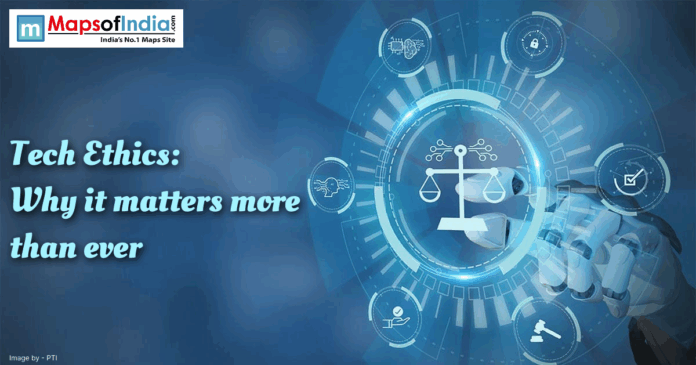Technology is the new normal in this world. The use of technology is shaping our world. From AI to social media, it can be used to achieve progress. But ethical dilemmas grow with this innovation. In recent years, with the surge of new technology, tech ethics has become a global topic of discussion. Data breaches, AI bias, and privacy issues are the main concerns and threats to the current society. Ethical frameworks guide responsible development. They protect users and society.
Defining Tech Ethics in 2025
Tech ethics studies the moral issues faced by current technological development. It covers AI, biotech, and digital platforms. An IEEE report defines it as responsible innovation. Tech ethics asks how new developing technology is impacting our society. Key areas in tech ethics include privacy and fairness. Ethical tech ensures user trust. This helps to balance profit with human welfare. According to the Stanford HAI article, more than 80% of tech firms lack ethics codes. Many issues arise, like data misuse, which sparks debate. Ethics guides AI in healthcare or hiring. It’s not just forming a rule for the machine but teaching our values. Tech ethics shape a just digital age.
Privacy and Data Protection Concerns
Privacy is a core ethical issue. The newly developed technologies to target consumers’ preferences collect vast amounts of data from the user. According to the recent Pew Research report, more than 64% of users fear data misuse. Companies like Google track the behavioural patterns of users. In 2024, more than 2.6 billion people were victims of Data breach incidents that happened worldwide. A recent Verizon report confirms this. Cambridge Analytica’s 2018 scandal exposed political manipulation using users’ data. Users demand control over their own data. GDPR in Europe fines these violators €20 million. A Forbes article notes rising lawsuits due to privacy issues. Ethical firms use encryption. They limit data collection. Transparency builds trust. Privacy failures harm reputations. Adopting strict data policies is urgent.
AI Bias and Fairness Challenges
The increasing use of AI in our daily lives has amplified human biases. Algorithms decide loans, jobs, and sentences according to your previous data present on the internet. According to a recent MIT Technology Review study, it has been noted that more than 70% of AI models show bias while providing results. Facial recognition misidentifies darker skin tones. According to the recent Nature article cites 20% error rates are cited for minorities. Amazon’s recent hiring algorithm favoured men over women. That algorithm was scrapped after receiving backlash from the public. Ethical AI needs diverse datasets. A recent McKinsey report says inclusive teams reduce bias. Regular audits catch errors. Fairness ensures equal outcomes. Unchecked AI deepens inequality. Ethics demands accountable algorithms.
Accountability in Autonomous Systems
Autonomous systems raise ethical stakes. We give power of life to these autonomous systems, like Self-driving cars make life-or-death choices for us. An IEEE Spectrum article discusses crash dilemmas. There are many questions that are still unanswered, like who is responsible when AI fails? Drones deliver medicine, but there is a risk of misuse. A recent Bloomberg report notes that 30% of firms dodge accountability when a tech makes a mistake. Clear ownership of this technology is needed. Ethical frameworks assign responsibility. Many suggest human oversight is important. Regulations lag behind tech. The EU’s AI Act fines up to €35 million. A recent Reuters article praises its rigour. Accountability protects users. It ensures trust in automation.
Environmental Impact of Technology
The incidence the growth in Tech innovations harms the environment. Data centres consume 2% of global energy. According to the recent IEA report, this percentage is predicted to rise by 50% by 2030. Bitcoin mining uses 121 TWh yearly. A Nature Climate Change study compares it to Argentina’s energy use. In recent years, the E-waste generated across the world has reached 62 million tons. According to the recent UN report says of all the e-waste generated, only 22% is recycled. Ethical tech prioritizes sustainability. Companies like Apple aim for carbon neutrality. Green algorithms optimize energy. Ethics demands eco-friendly tech. It reduces our planetary footprint.
Social Media and Mental Health
Digital platforms impact mental health. Social media fuels anxiety and addiction among users. A recent study conducted by The Lancet links it to 15% higher teen depression rates. Algorithms promote polarising content. A recent Oxford University report pointed out that 60% of users see harmful posts regularly. TikTok’s dopamine-driven feeds hook users. Ethical platforms limit addictive features. Many mental health organisations suggest using time caps. Transparent algorithms reduce harm. To moderate Content, we need humans, not just AI. A recent Wired article noted that 90% automation fails. Ethics prioritises user well-being. Healthy tech fosters balanced lives.
Workforce Disruption and Ethical Labour
The new technology developments are reshaping jobs. According to the World Economic Forum report, Automation will displace 30% of roles by 2030. Gig platforms like Uber offer flexibility in the workforce. But they lack worker protections. According to a recent ILO article, more than 70% of gig workers earn below minimum wage. AI tools like ChatGPT might replace some jobs, like a cashier. Ethical tech supports the reskilling of the workforce. With the increase in the use of technology, the workforce needs to change according. A recent McKinsey report stated that 100 million workers need training for new technology. Fair labour policies ensure benefits. Companies like Microsoft fund upskilling. Ethics balances innovation with human dignity. Workers deserve equitable futures.
Why Tech Ethics Matters Now
Tech ethics is a crucial thing needed in 2025. Innovation outpaces regulation. A recent Deloitte report says 85% of CEOs prioritise ethics. Use of unchecked tech can cause societal harm. Data breaches erode trust in the brands. Biased AI deepens inequality. A recent Stanford HAI article notes that 60% of users distrust tech firms. Environmental costs threaten sustainability. Mental health crises grow. Workforce disruptions demand action. Ethics ensures tech serves humanity. A recent UN report calls for global standards. Companies adopting ethics gain loyalty. Consumers demand accountability. Ethical tech builds a fairer world. Ignoring it risks chaos.
Conclusion
Adapting Tech ethics is a non-negotiable thing in recent times. Privacy demands robust data protection. To have a properly working AI, we require a bias-free algorithm. Autonomous systems require someone to hold accountability. Sustainability counters environmental harm. Social media must prioritise mental health. Fair labour practices support workers. Nowadays, tech shapes every facet of life. Ethical frameworks guide its path. A Harvard Business Review says 70% of firms plan to have ethics boards. Consumers drive change with choices. Governments push for stricter laws. Adopting ethics ensures trust and progress. Tech can uplift or harm. Choose ethics to shape a better future.





